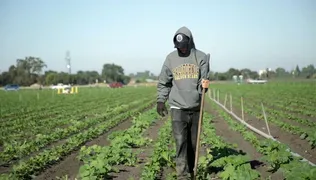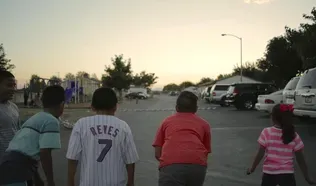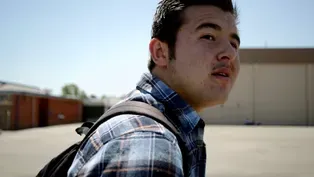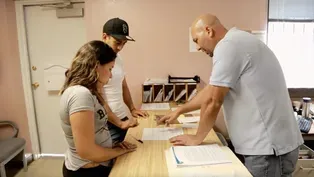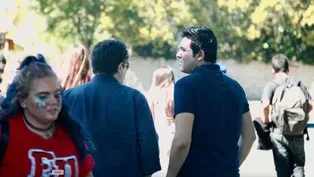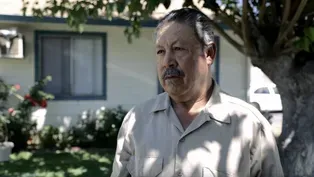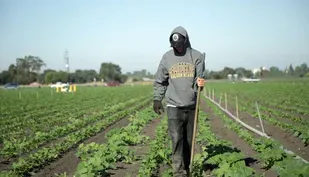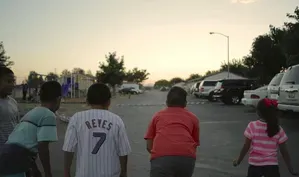
Como Vivimos (How We Live) | Migrant Separation
Clip: Season 12 Episode 6 | 59sVideo has Closed Captions
Jessica Romero opens up about being separated from her family during her senior year of high school.
Jessica Romero, a high school student, talks with her guidance counselor, Jessica Muñoz, about spending her senior year away from her family. She is staying in California while her parents must remain in Mexico due to the state's migrant laws that mandate they do not live in the area for at least 3 months.
Problems with Closed Captions? Closed Captioning Feedback
Problems with Closed Captions? Closed Captioning Feedback
Funding for America ReFramed provided by the Corporation for Public Broadcasting, John D. and Catherine T. MacArthur Foundation, Wyncote Foundation and Reva and David Logan Foundation.

Como Vivimos (How We Live) | Migrant Separation
Clip: Season 12 Episode 6 | 59sVideo has Closed Captions
Jessica Romero, a high school student, talks with her guidance counselor, Jessica Muñoz, about spending her senior year away from her family. She is staying in California while her parents must remain in Mexico due to the state's migrant laws that mandate they do not live in the area for at least 3 months.
Problems with Closed Captions? Closed Captioning Feedback
How to Watch America ReFramed
America ReFramed is available to stream on pbs.org and the free PBS App, available on iPhone, Apple TV, Android TV, Android smartphones, Amazon Fire TV, Amazon Fire Tablet, Roku, Samsung Smart TV, and Vizio.
Providing Support for PBS.org
Learn Moreabout PBS online sponsorshipJESSICA ROMERO: I will be coming back in January, so I could graduate from high school.
It's my last year.
My family's gonna stay back in Mexico until March because they can't be living here for three months while the camps are closed.
JESSICA MUÑOZ: Jessica Romero?
This is the first year she comes this early, so this is hard for her.
This is gonna be hard for you.
- Yeah.
- Yeah.
She always comes back in March.
- March.
- Aw... You'll be okay.
We will take care of you.
You'll be fine, okay?
Last year, I had a student who stayed from one relative to one friend to... so they're considered homeless.
So they're, so they're considered homeless.
I know it sounds like it's a bad thing, but it's not.
You get services for that.
So, um, so, I need to start asking students, especially the migrant, 'cause the camps are technically closed, so I have to start asking students, "Where are you living now?
Who are you living with?"
Um, just to see if we need to classify them as homeless.
Como Vivimos (How We Live) | Migrant Education
Video has Closed Captions
Students, whose parents are migrant farm workers, know all too well the education they are missing. (57s)
Como Vivimos (How We Live) | Migrant Housing
Video has Closed Captions
To qualify for one of California's migrant housing camps, workers must follow strict rules. (58s)
Como Vivimos (How We Live) | Migrant Mental Health
Video has Closed Captions
How do migrant students fare mentally when school is allowed only part of the academic year? (57s)
Como Vivimos (How We Live) | Migrant Work
Video has Closed Captions
The summer season means harvesting and much work for migrant workers in California. (34s)
Como Vivimos (How We Live) | Preview
Video has Closed Captions
California farmworker housing rules force seasonal moves, upending Latinx students' education. (30s)
Como Vivimos (How We Live) | Trailer
Video has Closed Captions
California farmworker housing rules force seasonal moves, upending Latinx students' education. (1m 25s)
Providing Support for PBS.org
Learn Moreabout PBS online sponsorshipFunding for America ReFramed provided by the Corporation for Public Broadcasting, John D. and Catherine T. MacArthur Foundation, Wyncote Foundation and Reva and David Logan Foundation.
